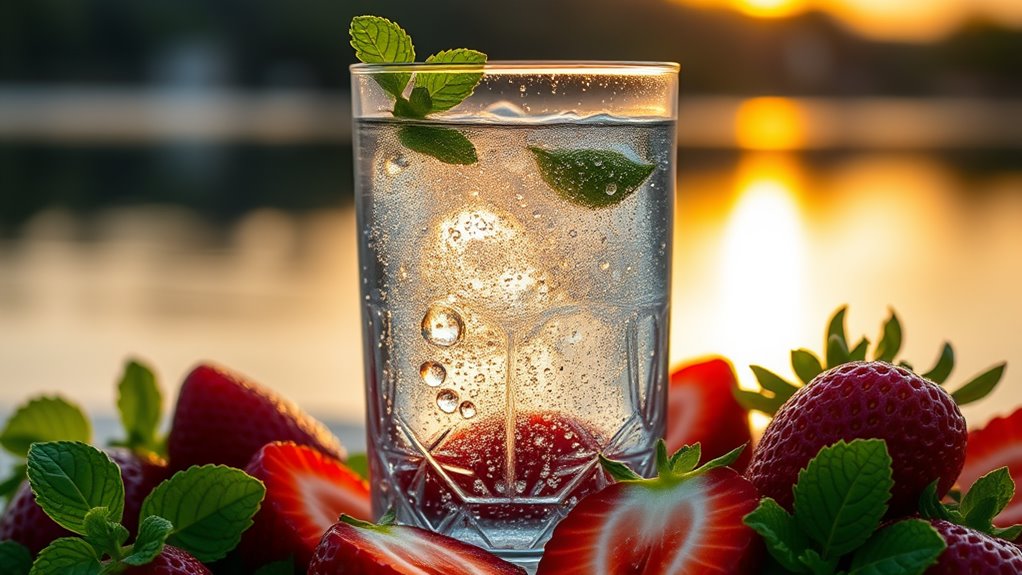
Several factors contribute to water tasting sweet. Natural minerals like calcium, magnesium, and potassium enhance sweetness, while bicarbonates stabilize pH levels. Filtration methods, such as reverse osmosis, can accentuate this sweetness by removing contaminants. Environmental influences, including geological formations and seasonal changes, also play a role in mineral content. Finally, personal health and perception can affect individual taste responses. Understanding these elements can give you deeper insights into why some water tastes sweeter than others.
When you sip on sweet-tasting water, it's not just your imagination; various factors are at play that influence this unique flavor profile. One prominent contributor is the presence of natural minerals. Groundwater often contains calcium and magnesium, which can create a sweet or "hard" water taste. Additionally, bicarbonates enhance sweetness and help stabilize pH levels, playing an essential role in how water tastes. Chlorides and sulfates, stemming from geological formations, can also impart a sweet or salty-sweet taste, while potassium, occasionally found in mineral-rich water, adds to this sweetness. Generally, higher mineral content elevates the perceived sweetness of water.
The method of water filtration you use can greatly affect the taste as well. For instance, a reverse osmosis system removes up to 99.7% of contaminants, which can accentuate the sweetness of the remaining minerals. Advanced filtration systems guarantee the water's purity, which can directly alter taste perception. Activated carbon filters, effective at eliminating organic compounds and chlorine, also improve the overall taste. More advanced purification technologies guarantee the water's purity, which can directly alter taste perception.
The filtration method significantly influences water taste, enhancing sweetness through mineral retention and contaminant removal.
However, keep in mind that the filtration process can either highlight or minimize natural sweetness depending on the specific contaminants removed. Regular maintenance of your filtration system is vital for optimizing efficiency and maintaining taste quality.
Environmental factors play a notable role, too. Seasonal changes can affect the conditions of your water source, leading to variations in mineral content and taste. The source of your water itself can result in differences, as varying geological formations contribute to the types of dissolved minerals present.
Algal blooms can introduce metabolites that lend a sweet taste to water, while microorganisms may also influence flavor through their metabolic byproducts. Local climate and geological characteristics dictate the mineral composition of your water, further affecting its taste.
Chemical composition is another important aspect. Certain organic compounds, including pesticides or industrial chemicals, can impart an unexpectedly sweet taste, while higher pH levels tend to create a sweeter flavor due to their buffering effects. Alkalinity impacts how minerals interact with your taste buds, enhancing the perceived sweetness.
Low concentrations of chlorine might even be mistaken for sweetness, complicating the flavor profile. Conversely, chemical contamination from industrial runoff can introduce substances that alter the taste of your water.
Finally, personal health and medications can influence your perception of sweetness. Health conditions can modify how your taste receptors respond, making water seem sweeter than it actually is. Some medications may enhance sweetness perception, while dehydration can also increase this effect as your body craves hydration.
Elevated blood sugar levels and hormonal changes can further affect your taste experience, adding another layer to why sweet-tasting water might be perceived differently from person to person. By understanding these factors, you gain insight into the complex interplay that shapes your water's flavor.
Conclusion
To sum up, the sweetness of water can be affected by various factors, including mineral content and filtration methods. While some might argue that all water should taste neutral, it's important to recognize that natural variations exist. Embracing these differences can enhance your hydration experience, making it not just a necessity but a pleasure. Ultimately, understanding what influences sweet-tasting water allows you to make informed choices and appreciate the subtleties in your daily hydration routine.



